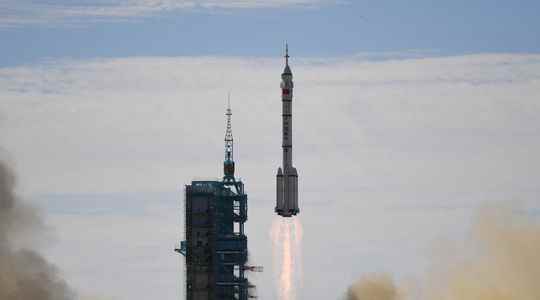On the Jiuquan launch pad, this Sunday, June 5, in the middle of the Gobi desert, the three taikonauts come to attention in front of their superiors in ceremonial military uniform. “Commander in Chief, we are now ready to leave, please give the order!” Cheng Dong yells. “Go ahead comrades!” responds just as solemnly Li Shangfu, at the head of this manned space flight program Shenzhou-14. The marching band sings the national anthem, while the People’s Liberation Army “Base 20” site 901 is covered in red flags waved by an audience of fans.
The crew, made up of a woman and two men, all military, then take their places in the cockpit before taking off aboard the Long March Rocket 2F for a seven-hour journey broadcast largely live on television. national, where jubilant engineers follow one another. “After docking, their mission is to install the modules of the two laboratories in the space station, specifies Jia Shijin, one of the architects of the Chinese program. It is a very heavy mission, certainly the most important ever carried out so far. .”
Strong acceleration under Xi Jinping
This stay in orbit, which will last six months, is the culmination of a project launched in 2003 with the sending of the first Chinese astronaut into space. Tiangong, or “the Heavenly Palace”, the name given to the Chinese space station, the first module of which was put into orbit last year, will be permanently inhabited, just like the International Space Station (ISS), of which China has been excluded by the United States.
Under the presidency of Xi Jinping, the space adventure has experienced a strong acceleration. The Middle Kingdom landed a device on the far side of the Moon in early 2019, a world first. In 2020, he brought back samples and finalized Beidou, his satellite navigation system, a competitor to the American GPS. And last year he landed a little robot on Mars. And it’s not over: by 2030, China plans to send men to the Moon, bring back samples from asteroids near Earth, but also from Mars, and launch a probe to Jupiter. With, in sight, the objective of establishing itself as the first space power in 2045.
Second world space budget
The Chinese star race aims above all to give the country a great moment of national pride, in its competition with the United States for world leadership. Like the USSR before it, China made the conquest of space a showcase of its power and technological progress. She also has in mind military aspects of controlling space and destroying enemy satellites, and exploiting the subsoil of the Moon and Mars to extract rare minerals. “The Chinese are prolific in all aspects, they have the political motivation and the resources to fund their programs,” the official explained. BBC Lucinda King, head of space projects at the University of Portsmouth in Great Britain.
Already, the Asian giant has the second largest space budget in the world, with 10.3 billion dollars in public spending last year, far behind the United States (nearly 55 billion), but ahead of Japan (4.2 billion) and France (4 billion), according to the specialist firm Euroconsult. “But in reality, argues a European expert, the Chinese budget is camouflaged in the military budget, which is itself particularly opaque. China is certainly investing a lot more and this should continue because the Chinese President, Xi Jinping, has made it a national priority.”
At least 300,000 people work on space projects in China, according to the official Xinhua news outlet, 18 times more than the number of professionals employed by NASA. Like its American rival, the Chinese National Space Administration (CMSA) has opened up to the private sector. Since 2016, around 100 companies have invested more than $1.5 billion a year in total in this sector, according to Chinese media, in order to develop satellites and launchers. Some even target the space tourism niche. The American SpaceX has been warned!
